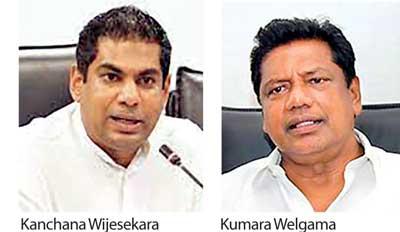22 Sep 2022 - {{hitsCtrl.values.hits}}
As religious leaders, led by Buddhist monks, took to streets this week and intensified their agitation against the recent electricity tariff hike, claiming that they wouldn’t honour their bills, views were expressed by both government and opposition members in Parliament that subsidies on tariffs could not be extended under any circumstance, jeopardising the financial viability of the Ceylon Electricity Board (CEB) and thereby the national economic stability.
 Responding to a query on the outrage expressed by the monks, Power and Energy Minister Kanchana Wijesekara told in Parliament that there aren’t power stations, which generate low-cost power specifically for the religious places.
Responding to a query on the outrage expressed by the monks, Power and Energy Minister Kanchana Wijesekara told in Parliament that there aren’t power stations, which generate low-cost power specifically for the religious places.
“There isn’t a different set of power stations, which generate power at a lesser cost only for religious places,” he told Parliament on Tuesday.
“Until recently, there were religious places whose electricity bills were paid by the CEB. What the Public Utilities Commission has advised us was not to pay even those,” Wijesekara added.
It was only last week that the transport sector experts called in one chorus to end all forms of subsidies on energy and get the pricing right on all things, which transcend beyond the transport sector to restore economic stability.
Sri Lanka is currently on a somewhat progressive reform path after its economy plunged to its depths, an opportunity, which should not be squandered as has been a signature feature in Sri Lanka’s past.
Joining in the debate, opposition parliamentarian Kumara Welgama echoed the sentiments of these experts and of Wijesekara.
“Subsidies cannot be given,” he flat out said. “We plunged into the current depths by extending these subsidies,” he added.
In a scathing attack on those who stage protests against the tariff hike, Welgama said those who talk big on this matter are those who travel in V8s, referring to one of the most comfortable and expensive forms of SUVs that are available in the market.
Meanwhile, the chief prelates in the country on Tuesday wrote to President Ranil Wickremesinghe calling for concessional tariffs on electricity for religious places, citing the enormous service they render to society.
According to the data presented by Wijesekara, 36,000 religious places, out of the total 48,000 available in the country, still pay a maximum of Rs.3,990, even after the tariff revision.
Hence, he said the ministry has focused particularly on the balance 12,000 places to design a programme to provide them electricity using solar power.
However, as solar panels cannot be imported, due to the crippling dollar shortage, Wijesekara said they are looking at bringing down solar panels under a loan scheme from India and China, to provide redress for the most affected.
07 Nov 2024 46 minute ago
07 Nov 2024 2 hours ago
06 Nov 2024 9 hours ago
06 Nov 2024 06 Nov 2024
06 Nov 2024 06 Nov 2024